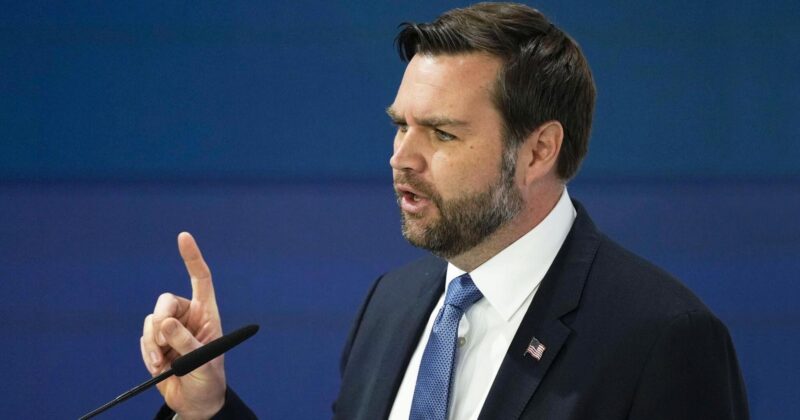Dozens of police teams across Germany raided homes before dawn in a coordinated crackdown on a recent Tuesday. The state police weren’t looking for drugs or guns, they were looking for people suspected of posting “hate speech” online.
As prosecutors explain it, the German constitution protects free speech, but not hate speech. And here’s where it gets tricky: German law prohibits speech that could incite hatred or is deemed insulting. Perpetrators are sometimes surprised to learn that what they post online is illegal, according to Dr. Matthäus Fink, one of the state prosecutors tasked with policing Germany’s robust hate speech laws.
“They don’t think it was illegal. And they say, ‘No, that’s my free speech,’” Fink said. “And we say, ‘No, you have free speech as well, but it is also has its limits.’”
60 MINUTES GUSHES OVER GERMAN CENSORSHIP.
Insulting someone is a crime. Who decides what is an insult.pic.twitter.com/aHNFsKWtRT
— Citizen Free Press (@CitizenFreePres) February 17, 2025
Germany’s laws around speech
In Germany, it can be a crime to publicly insult someone, and the punishment can be even worse if the insult is shared online because that content sticks around forever, Fink said.
Fink, and prosecutors Svenja Meininghaus and Frank-Michael Laue, explained that German law prohibits the spread of malicious gossip, violent threats and fake quotes. Reposting lies online can also be a crime.
“The reader can’t distinguish whether you just invented this or just reposted it,” Meininghaus said. “It’s the same for us.”
The punishment for breaking hate speech laws can include jail time for repeat offenders. But in most cases, a judge levies a stiff fine and sometimes keeps the offender’s devices.
“It’s a kind of punishment if you lose your smartphone. It’s even worse than the fine you have to pay,” Laue said.
Investigating and policing speech online
There are 16 units across the country in Germany, investigating online hate speech.
Laue, a career criminal prosecutor, leads the Lower Saxony unit, which works on around 3,500 cases a year. Nine investigators work out of the office. They get hundreds of tips a month from police, watchdog groups and victims, Laue said. His unit has successfully prosecuted about 750 hate speech cases over the last four years.
In one case, an online post suggested that refugee children should play in electrical wires, Laue said. The accused had to pay a fine of 3,750 euros.
“It’s not a parking ticket,” Laue said.
To build their cases, investigators scour social media and use public and government data. Laue says sometimes, social media companies will provide information to prosecutors, but not always. So the task force employs special software investigators to help unmask anonymous users.
Last year, the European Union implemented a new law requiring social media companies to stop the spread of harmful content online in Europe, or face millions of dollars in fines. Some social media companies are not complying with the new law, Josephine Ballon, a CEO of HateAid, a Berlin-based human rights organization that supports the victims of online violence, said.
“I would love social media companies to be a safer place than they are right now. But what we see is that their content moderation is not comprehensive. Sometimes it seems to be working well in some areas, but in many areas, it’s just not,” Ballon said.
The European Commission, the executive arm of the EU, is currently investigating whether Elon Musk’s social media company X has breached the EU digital content law. Musk — who has been criticized for using X to promote Germany’s right-wing party ahead of national elections — accused the EU of censorship and hating democracy.
JD Vance Was Right
The interview comes just days after Vice President JD Vance spoke in Munich about the dangers posed by European nations like Germany when they policed the free speech of and even outright censored their people.
“Democracy rests on the sacred principle that the voice of the people matters. There’s no room for firewalls,” Vance said. “You either uphold the principal or you don’t.”
NOW – U.S. Vice President Vance says there is “no room for firewalls” ahead of the German election, where all other parties refuse to work with the AfD even though millions will vote for the right-wing party. pic.twitter.com/VZmlaFuho7
— Disclose.tv (@disclosetv) February 14, 2025
It also comes just a few hours after “Face the Nation” host claimed — during an interview with Secretary of State Marco Rubio — that the Holocaust had been caused by the fact that “free speech was weaponized.”
Rubio quickly shut Brennan down, explaining that censorship had been one of the hallmarks of the Nazi regime.

